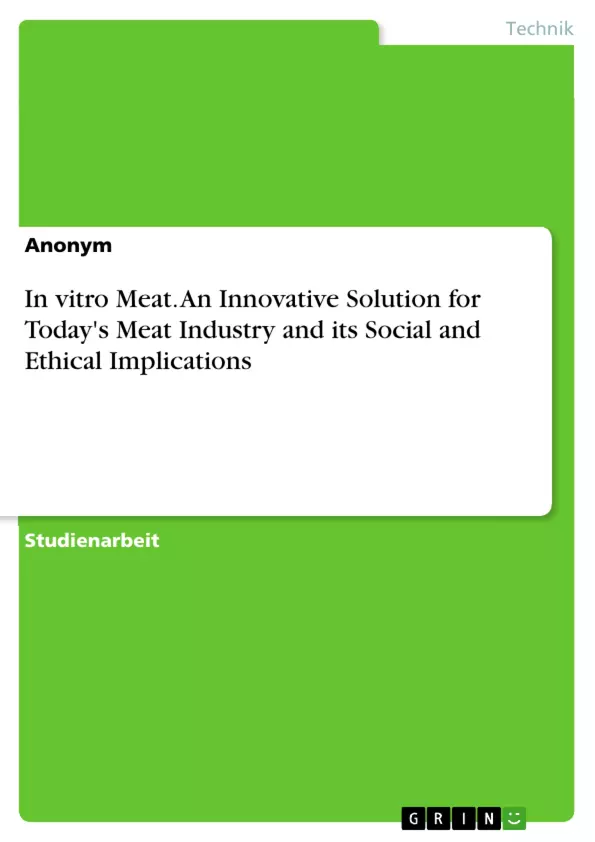Our objective is to highlight the scientific study about in vitro meat production and its social and ethical implications. The article also underlines the environmental impacts of current meat production and provides insights into the visions and actors in this field.
The 2017 study "In vitro meat: a technical vision to solve the problems of today's meat production and consumption?" conducted by the Karlsruhe Institute of Technology and funded by the German Federal Ministry of Education and Research, sheds light on an innovative method of meat production and its related social and ethical aspects. The study initially outlines the current state of research and explains the production of in vitro meat in a simplified way. Subsequently, it illustrates the negative environmental impacts of current meat consumption. The study also discusses animal welfare, which has been considerably compromised due to industrialization, as well as consumer behavior and its consequences for humans. These points are complemented by interviews with experts and stakeholders, both proponents and critics. Lastly, it introduces the visions and actors or start-ups in the field of in vitro meat. Topics like sustainability, animal welfare, veganism, and environmental protection are increasingly coming into focus, making this subject highly topical and relevant.
Inhaltsverzeichnis
- 1 Study selection
- 2 Summary
- 2.1 State of the research
- 2.2 Problems of industrial meat production
- 2.3 Effects of meat consumption on humans
- 2.4 Data collection and evaluation
- 2.5 Results of the study
- 2.6 Assessment of the study
- 2.7 Hypotheses
- 2.8 Possible follow-up questions
- 3 Reflection on the portfolio
- 3.1 Weakness compensation
- 4 Development of the follow-up study
- 4.1 Theoretical assumptions of the follow-up study
- 4.2 Hypotheses of the follow-up study
- 4.3 Research design of the follow-up study
- 4.4 Definition of the sample size
- 4.5 Data evaluation procedures
- 4.6 Conclusion
Zielsetzung und Themenschwerpunkte
Die Studie befasst sich mit dem Thema "In-vitro-Fleisch" und untersucht dessen Potenzial als Alternative zur konventionellen Fleischproduktion. Sie analysiert die sozialen und ethischen Aspekte dieser Innovation und bewertet ihre Eignung zur Lösung der Probleme, die mit der heutigen Fleischproduktion und dem Konsum verbunden sind.
- Bewertung der Eignung von In-vitro-Fleisch als nachhaltige Alternative
- Analyse der Auswirkungen auf die Umwelt, die Tierhaltung und den menschlichen Körper
- Untersuchung der ethischen und sozialen Implikationen von In-vitro-Fleisch
- Beurteilung der Akzeptanz und des Potenzials der Technologie in der Gesellschaft
- Bewertung der Rolle von In-vitro-Fleisch im Kontext von Nachhaltigkeit und Tierschutz
Zusammenfassung der Kapitel
Die Studie beginnt mit einer Einführung in das Thema In-vitro-Fleisch, erklärt den Produktionsprozess und beleuchtet den Stand der Forschung. Anschließend werden die Herausforderungen und Probleme der konventionellen Fleischproduktion im Hinblick auf die Umwelt, die Tierhaltung und den menschlichen Körper analysiert. Die Studie präsentiert und diskutiert In-vitro-Fleisch als mögliche alternative Lösung. Im weiteren Verlauf werden qualitative Interviews mit Experten und Stakeholdern sowie eine teilnehmende Beobachtung einer Gruppe von Teilnehmern präsentiert, um verschiedene Perspektiven auf In-vitro-Fleisch zu beleuchten. Abschließend werden die Ergebnisse der Studie zusammengefasst und ein Ausblick auf mögliche weitere Forschungsfragen gegeben.
Schlüsselwörter
In-vitro-Fleisch, Fleischproduktion, Nachhaltigkeit, Tierschutz, Umweltbelastung, Fleischkonsum, ethische Aspekte, soziale Implikationen, Stakeholder-Interviews, Citizen Jury, Forschungsstand, Technologiebewertung, alternative Lösungen, Zukunftsperspektiven.
Häufig gestellte Fragen
Was ist In-vitro-Fleisch?
In-vitro-Fleisch wird im Labor aus tierischen Muskelzellen gezüchtet, ohne dass dafür Tiere in konventioneller Form gehalten und geschlachtet werden müssen.
Welche ökologischen Vorteile bietet In-vitro-Fleisch?
Es hat das Potenzial, den Ressourcenverbrauch (Wasser, Land) und die Treibhausgasemissionen im Vergleich zur industriellen Tierhaltung massiv zu senken.
Welche ethischen Aspekte werden bei dieser Technologie diskutiert?
Diskutiert werden vor allem die Verbesserung des Tierschutzes, die Akzeptanz bei Konsumenten (z. B. Veganern) und die Frage nach der Natürlichkeit des Produkts.
Wie ist der aktuelle Stand der Forschung zu In-vitro-Fleisch?
Studien, wie die des Karlsruher Instituts für Technologie (KIT), untersuchen technische Visionen, die Marktfähigkeit und die gesellschaftlichen Auswirkungen dieser Innovation.
Könnte In-vitro-Fleisch die konventionelle Fleischindustrie ersetzen?
Es wird als innovative Lösung für Probleme wie Umweltbelastung und Welternährung gesehen, doch hängen Erfolg und Ablösung von der technologischen Skalierbarkeit und Verbraucherakzeptanz ab.
- Quote paper
- Anonym (Author), 2023, In vitro Meat. An Innovative Solution for Today's Meat Industry and its Social and Ethical Implications, Munich, GRIN Verlag, https://www.grin.com/document/1375748



